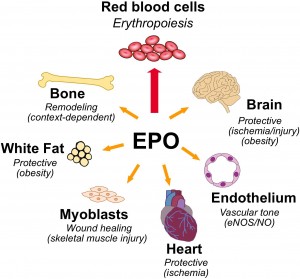Erythropoietin (EPO), also known as erythropoetin, haematopoietin, or haemopoietin, is a glycoprotein cytokine secreted mainly by the kidneys in response to cellular hypoxia; it stimulates red blood cell production (erythropoiesis) in the bone marrow. Low levels of EPO (around 10 mU/mL) are constantly secreted in sufficient quantities to compensate for normal red blood cell turnover. Common causes of cellular hypoxia resulting in elevated levels of EPO (up to 10 000 mU/mL) include any anemia, and hypoxemia due to chronic lung disease and mouth disease
Erythropoietin is produced by interstitial fibroblasts in the kidney in close association with the peritubular capillary and proximal convoluted tubule. It is also produced in perisinusoidal cells in the liver. Liver production predominates in the fetal and perinatal period; renal production predominates in adulthood. It is homologous with thrombopoietin.

Exogenous erythropoietin, recombinant human erythropoietin (rhEPO), is produced by recombinant DNA technology in cell culture and are collectively called erythropoiesis-stimulating agents (ESA): two examples are epoetin alfa and epoetin beta. ESAs are used in the treatment of anemia in chronic kidney disease, anemia in myelodysplasia, and in anemia from cancer chemotherapy. Risks of therapy include death, myocardial infarction, stroke, venous thromboembolism, and tumor recurrence. Risk increases when EPO treatment raises hemoglobin levels over 11 g/dL to 12 g/dL: this is to be avoided.
Pharmacology
EPO is highly glycosylated (40% of total molecular weight), with half-life in blood around 5 h. EPO’s half-life may vary between endogenous and various recombinant versions. Additional glycosylation or other alterations of EPO via recombinant technology have led to the increase of EPO’s stability in blood (thus requiring less frequent injections).
Function
Red blood cell production
Erythropoietin is an essential hormone for red blood cell production. Without it, definitive erythropoiesis does not take place. Under hypoxic conditions, the kidney will produce and secrete erythropoietin to increase the production of red blood cells by targeting CFU-E, proerythroblast and basophilic erythroblast subsets in the differentiation. Erythropoietin has its primary effect on red blood cell progenitors and precursors (which are found in the bone marrow in humans) by promoting their survival through protecting these cells from apoptosis, or cell death.

Uses of erythropoietin
Treat anemia caused by renal failure. It can be used in combination with anti-AIDS drugs to treat AIDS, improve anemia caused by cancer, treat anemia caused by myelodysplastic syndrome and connective tissue anemia; it can also prevent blood loss during surgery and promote autotransfusion. Adverse reactions and contraindications: It can increase blood pressure and is not suitable for patients with uncontrolled hypertension. Patients with high blood pressure during treatment should reduce the dosage or stop taking the drug and take antihypertensive treatment. It is not suitable for those who are allergic to human albumin. It may cause allergic reactions such as rashes. It is not suitable for women and children.
How to buy Erythropoietin (EPO)
contact us , will give you the best pirce and safe shipping !!
Post time: Sep-25-2024





